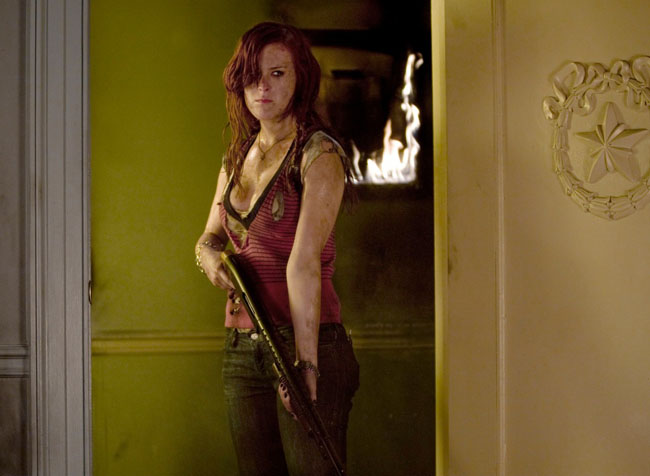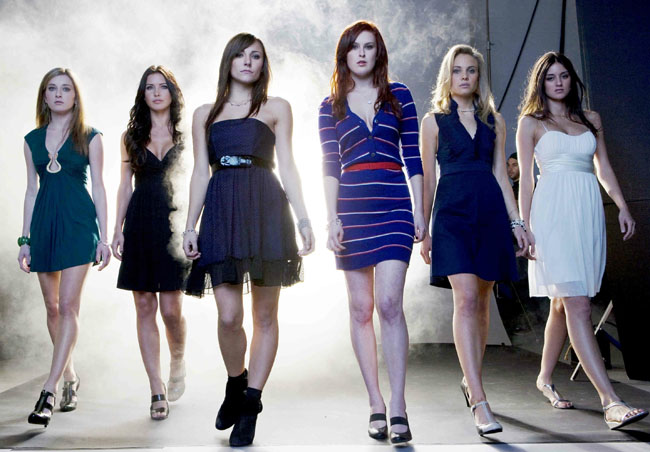CHICAGO – In anticipation of the scariest week of the year, HollywoodChicago.com launches its 2024 Movie Gifts series, which will suggest DVDs and collections for holiday giving.
Interview: The Journey of Rumer Willis With a Stop in ‘Sorority Row’
CHICAGO – Rumer Willis, the progeny of popular stars Bruce Willis and Demi Moore, is now on her own as a young actor and continuing her movie career with a role in “Sorority Row,” opening on Friday this week.
HollywoodChicago.com got a chance to interview Ms. Willis, as she talks about her life in the spotlight, her experiences on-set in filming Sorority Row and the inspirations that continue to drive her life and career.
 Photo credit: © 2009 Summit Entertainment |
HollywoodChicago.com: What was different about the Sorority Row experience than any other film or TV show you’ve performed on?
Rumer Willis: It was a great, dynamic group of women and we immediately bonded. I like this movie because it was a female driven cast and it’s a horror film that’s character driven. Most horror films are about the plot and the killer and all that. But this is about all the girls’ journeys, dealing with an intense emotional situation. That was one thing that really attracted me to it. And it’s really funny, really witty. I was pleased how much the humor came through, especially with our chemistry.
HC: This film is essentially a remake of 1983’s ‘House on Sorority Row.’ I noted in the production notes that the screenwriter said the “morals had changed” between then and now. What were you able to get away with in this film that the other couldn’t, because of the difference between the eras?
RW: None of us have actually seen the original. They didn’t want us to watch it so it wouldn’t effect our performances. I felt anyway it was more about taking an idea and the premise, but changing it up and making it more relevant.
Apparently the original is pretty campy, this one I think is more scary. I was actually scared at the screening and I know what happens. That is the difference.
HC: You had to scream a lot in this film. How do you motivate yourself as an actress for that? Is it evoking a feeling of fear or just a certain energy?
RW: I think it’s both. The energy especially has to be high when doing certain emotional scenes. For me at least, when I would scream, it would get me into that mindset. When you scream enough, your hands start to shake and I got really into it much more.
I did think about the back story of the character and her relationship to different things. And my character is just having a mental breakdown and can’t handle anything. So it really made sense that she’s just screaming all the time.
HC: You never were in a sorority in real life. What do you find either odd or enticing about that life, even at the level that you were pretending to be in one?
RW: The main foundation of sororities, I think, is to create a forum for people to get to know each other on campus. I mean, going away to college, the first year on your own, it really is a way to create a sisterhood which can last you a lifetime.
We created our own sorority sisterhood off set. To be able to make friendships with women – in the sense whatever you need, whenever you need it – you’ll have people that will be there for you. And that’s a great thing.
 Photo credit: © 2009 Summit Entertainment |
HC: Carrie Fisher has a reputation for being blunt and outrageous. Do you have any anecdotes from working with her on Sorority Row?
RW: She’s so unbelievably witty and intelligent. At times, she’d be really quiet and we’d be in the make-up trailer, then she’d sneak in a line or a little tidbit. I wouldn’t realize until later…then I would think back and say, ‘What? That was brilliant!’
But really seeing her wielding a shotgun, as the housemother, could not have been any better. How could you not love that?
HC: What training in acting or performance, if any, has prepared you most for the ‘hurry up and wait’ nature of film and TV production?
RW: I knew what it was to work on a set from a very young age. It isn’t really a surprise to me. Some people complain, but to me I don’t know why you ever would. To have an opportunity to do something you love when there are so many young actors competing for the same thing is special.
It can be difficult at times, when doing these intense emotional scenes. But thankfully this shoot was pretty quick. It was 20 degrees, so there was a motivation to get it done a little quicker (laughs). You have to step out of it when it’s over or at lunch breaks and I don’t have a hard time doing that. You actually need those breaks to recharge.
HC: If you could have the choice of any kind of role in the movies, what kind of character would it be?
RW: I enjoy anything that pushes me or challenges me outside of the ‘comfort zone,’ that’s how you grow the most. It would be really fun to play the antagonist, the ‘bad guy,’ if I could play it in a way where people really didn’t like the character. That’s when you know you’re doing a good job.
If you’ve done something in the past where people have liked your character, and then turn around and do something where they hate you, that’s potentially really cool.
 Photo Credit: © 1980 Universal |
HC: In this era of tabloids, what is the weirdest thing you’ve read or heard about either you or your extended family that really made you laugh?
RW: I don’t read that stuff, ever. In general, if you so let yourself get involved in that then you are letting the opinions of others dictate your life.
I knew about it at a very young age, but it’s much more intense now. They follow you, but I always wonder after one shot, are people really going to want to see the same thing over and over? “Wow, Rumer Willis is in a grocery store.” The amount of work I’ve done is not necessarily equal to the amount of media attention that I get. At the end of the day, I don’t have any feelings about it either way, it is what it is.
HC: You were raised in Idaho and moved to Los Angeles during high school. What differences between those parts of the country do you observe that make it both better and worse when comparing the two areas?
RW: I was in a boarding school in Michigan for my first two years of high school, which was a mini-Julliard, studying theater and classical opera. And then halfway through that is when my Dad was shooting ‘Hostage’ and he told me there was a part. That’s when I left the Michigan school and moved to Los Angeles.
I loved growing up in Idaho, which has a lot to do with certain values I have. It’s odd, in a way I did grow up fast but at the same respect I didn’t, because the things I knew about when I was 14 years old and in Idaho are different from my sisters, who primarily grew up in L.A.
At a certain point in Idaho you reach a limit of growth, especially in regards to the creative arts that I wanted to pursue. I wanted to branch out, and going to the school then moving to L.A. allowed me to do that. If you’re a young actor, there isn’t any other place you would want to be, because the work is there.
HC: You mentioned your training in classical opera and theater. How did that training help you overall in performance?
RW: The opera training really helped me with the screaming in the movie (laughs). And every actor should do theater once in their life, even if they don’t do a play, because there are no ‘do-overs.’ That gives you the foundation to be much more versatile and do many more things in acting. It helps with the confidence.
HC: Your family’s roots on both your father and mother’s side was working class. Given the lifestyle that they both have built and you have enjoyed, how important is it to you and your parents to remember those working class roots?
RW: It is very important for my parents and for Ashton [Kutcher] as well. They really started from more modest roots than where they ended up. If I hadn’t grown up in my circumstances, I probably would have done the same thing.
It is a constant in our lives to remember where we came from. I never wanted anything handed to me, to be that girl who does nothing with her life. I would be bored out of my mind for one thing, and if you don’t earn the things you receive in your life you never learn to appreciate them, because it just doesn’t feel right.
 | By PATRICK McDONALD |


